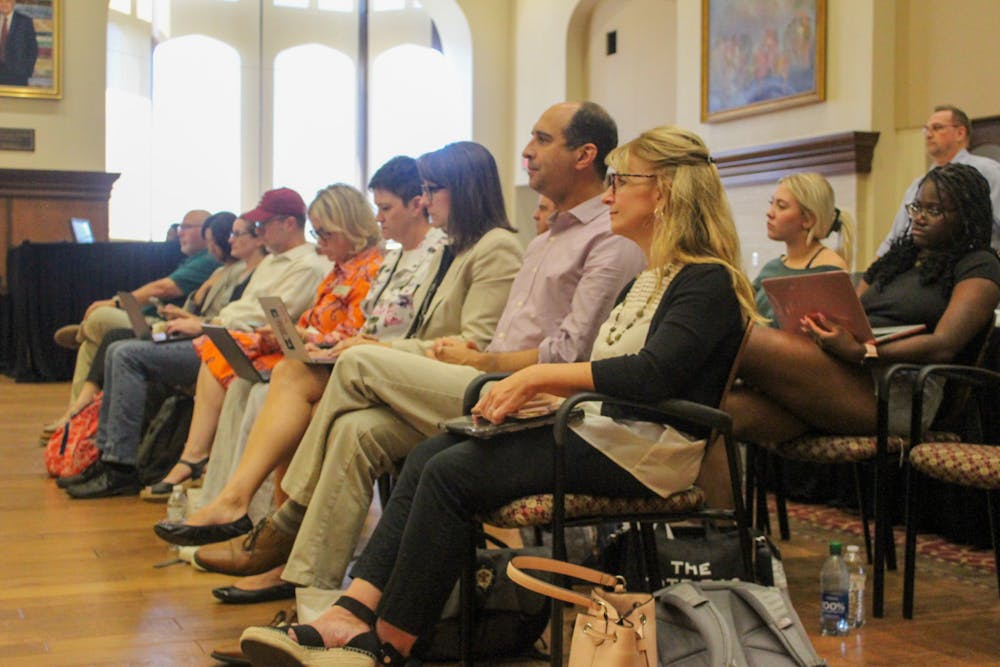The Bloomington Faculty Council met Tuesday in Presidents Hall to discuss the Supreme Court of the United States’ recent ruling on affirmative action, new demands being made by faculty members and IU’s new classes registration plan.
In June, SCOTUS issued a decision limiting colleges and universities’ consideration of race and ethnicity in the admissions process.
David Johnson, vice provost for enrollment management, said in the BFC meeting that the IU General Counsel collectively made the decision to remove race from the admissions application process.
According to Johnson, the individual applications will allow applicants to voluntarily add their race for reporting purposes, but an application reviewer cannot see the race reported. Johnson also emphasized that SCOTUS did not specifically limit using race for scholarships, financial aid and recruiting, so race will still be considered in these cases.
David Daleke, dean of the IU graduate school, said that questions about race and ethnicity will also be removed from graduate school applications. Daleke also said that they are encouraging application reviewers to keep a record of the reasons why they admit an applicant.
IU Vice President of the General Counsel Anthony Prather, said that he, Johnson and Daleke established the “Race and Admissions Inventory and Planning Project” in January 2023 to prepare IU for the possible outcomes of the SCOTUS ruling on affirmative action.
Prather said the project inventories race conscious policies, practices and procedures, potentially effective programs and public information considering race across all of IU campuses. This includes inventories of programs related to admissions, financial aid scholarships, fellowship, support and pathway programs and recruitment.
Prather also said that legacy status or donor affiliation can still be considered in the application process preference.
Later in the meeting, the BFC discussed faculty concern about the increasing demands of their job.
Newly elected BFC President Colin Johnson said he shared the faculty’s new demands with the IU Board of Trustees at their Aug. 25 meeting.
He said he spoke to the trustees about the increasing demands on faculty members’ time due to the growth and complexity of the IU. Johnson asked that faculty members be freed of these demands and allowed to stick to teaching and their research. Johnson also asked that faculty receive assurances that the stability of the institution is safe.
During the meeting, IU Provost and Executive Vice President Rahul Shrivastav also announced that there will be a change in the registration process for summer classes this upcoming semester. He said students will now need to register for summer classes at the same time they register for the fall classes for the next academic year.
Previously these were two separate dates. He said that he hopes this change will increase the summer enrollment, four-year graduating rates and time to complete a degree.
The BFC consists of 72 members: 59 elected members, six senior administrators, one ROTC representative, two staff representatives, three graduate students and two undergraduate students. The BFC is responsible for policy making and establishing faculty jurisdiction on campus.
The BFC currently has 16 standing committees and five elected committees. The standing committees oversee subjects from education policies to long-range planning. The elected committees include the Athletics Committee, Faculty Board of Review, Faculty Mediation Committee, Faculty Misconduct Review Committee and the Student Academic Appointee Board of Review.
Faculty members can run to serve on each of these committees. The Nomination Committee then chooses candidates and the BFC elects the final membership. The BFC meets on the first and third Tuesdays of the month from 2:30 p.m. to 4:30 p.m. during the school year. Each meeting is open to non-members.
An audio recording of the meeting can be found here.



